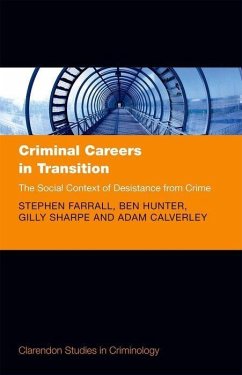Stephen Farrall, Ben Hunter, Gilly Sharpe, Adam Calverley
Criminal Careers in Transition
The Social Context of Desistance from Crime
Stephen Farrall, Ben Hunter, Gilly Sharpe, Adam Calverley
Criminal Careers in Transition
The Social Context of Desistance from Crime
- Gebundenes Buch
- Merkliste
- Auf die Merkliste
- Bewerten Bewerten
- Teilen
- Produkt teilen
- Produkterinnerung
- Produkterinnerung
Charting the processes associated with desistance from crime for a cohort of ex-probationers as they continue their social and personal development (including the impact of parenthood), as well as their motivations to change to, and maintain, a law-abiding lifestyle.
Andere Kunden interessierten sich auch für
![Practical Criminal Investigations in Correctional Facilities Practical Criminal Investigations in Correctional Facilities]() William R BellPractical Criminal Investigations in Correctional Facilities197,99 €
William R BellPractical Criminal Investigations in Correctional Facilities197,99 €![Female Offenders and Reentry Female Offenders and Reentry]() Female Offenders and Reentry197,99 €
Female Offenders and Reentry197,99 €![Women academics' careers in Kenya Women academics' careers in Kenya]() Pamela RaburuWomen academics' careers in Kenya53,99 €
Pamela RaburuWomen academics' careers in Kenya53,99 €![Advancing Beyond the Ceiling Advancing Beyond the Ceiling]() Olutoyin OyeladeAdvancing Beyond the Ceiling38,99 €
Olutoyin OyeladeAdvancing Beyond the Ceiling38,99 €![Criminal Law, Feminism and Emotions Criminal Law, Feminism and Emotions]() Latika VashistCriminal Law, Feminism and Emotions198,99 €
Latika VashistCriminal Law, Feminism and Emotions198,99 €![Pursuing Careers? Pursuing Careers?]() Maura O'ReganPursuing Careers?53,99 €
Maura O'ReganPursuing Careers?53,99 €![Action Research in Criminal Justice Action Research in Criminal Justice]() Action Research in Criminal Justice198,99 €
Action Research in Criminal Justice198,99 €-
-
-
Charting the processes associated with desistance from crime for a cohort of ex-probationers as they continue their social and personal development (including the impact of parenthood), as well as their motivations to change to, and maintain, a law-abiding lifestyle.
Hinweis: Dieser Artikel kann nur an eine deutsche Lieferadresse ausgeliefert werden.
Hinweis: Dieser Artikel kann nur an eine deutsche Lieferadresse ausgeliefert werden.
Produktdetails
- Produktdetails
- Verlag: Oxford University Press, USA
- Seitenzahl: 350
- Erscheinungstermin: 1. Oktober 2014
- Englisch
- Abmessung: 216mm x 142mm x 28mm
- Gewicht: 544g
- ISBN-13: 9780199682157
- ISBN-10: 0199682151
- Artikelnr.: 47870806
- Herstellerkennzeichnung
- Libri GmbH
- Europaallee 1
- 36244 Bad Hersfeld
- gpsr@libri.de
- Verlag: Oxford University Press, USA
- Seitenzahl: 350
- Erscheinungstermin: 1. Oktober 2014
- Englisch
- Abmessung: 216mm x 142mm x 28mm
- Gewicht: 544g
- ISBN-13: 9780199682157
- ISBN-10: 0199682151
- Artikelnr.: 47870806
- Herstellerkennzeichnung
- Libri GmbH
- Europaallee 1
- 36244 Bad Hersfeld
- gpsr@libri.de
Professor Stephen Farrall is Professor of Criminology in the School of Law at Sheffield University. Criminal Careers in Transition represents the third book in a series of his publications, which have charted the processes associated with desistance from crime for a cohort of ex-probationers, joining previous books: Rethinking What Works With Offenders (Willan, 2002) and Understanding Desistance From Crime (Open University Press, 2006). His more recent research focuses on the long-term effects of Thatcherite social and economic policies on crime, and is funded by the Economic and Social Research Council. Dr Gilly Sharpe is a Lecturer in Criminology in the School of Law at the University of Sheffield. Gilly's research interests converge on the impact of state intervention on poor, marginalised and vulnerable groups. Previous publications have examined criminalised young women (Offending Girls: Young Women and Youth Justice, Routledge, 2012), the support and supervision of women lawbreakers, including ex-prisoners and their children, and persistent young offenders. Gilly's current research focuses on transitions into adulthood amongst women criminalised as children. Prior to entering academia, Gilly was a practitioner in youth justice and the voluntary sector. Dr Ben Hunter is a Senior Lecturer in Criminology, in the School of Law at the University of Greenwich. His research interests include desistance from crime, white-collar crime and the contributions existential philosophy can make to understanding offenders' lives. His research combined these interests to assess the accounts of white-collar offenders who resettled following conviction and punishment. Dr Adam Calverley is a Lecturer in Criminology in the School of Social Sciences at the University of Hull. This book marks a continuation of his involvement in this project, having been researcher and co-author of the previous book in this series Understanding Desistance from Crime. His research interests include ethnicity, crime and criminal justice and life after punishment and publications include the Home Office Research Study, Black and Asian Offenders on Probation and the research monograph Cultures of Desistance (Routledge) - the first investigative study to examine processes of processes of desistance among minority ethnic offenders.
* PART ONE: WHAT WE DID, HOW WE DID IT, AND WHY WE DID THAT WAY
* 1: Critically Reviewing What We Know about Why People Stop Offending
* 2: Integrating Structural and Individual-Level Processes in Criminal
Careers Research
* 3: The Mechanics of Studying Desistance from Crime: An Exemplar of a
Qualitative Longitudinal Research Project
* PART TWO: WHAT WE DISCOVERED
* 4: The Offending Trajectories of Sample Members
* 5: The Long-Term Impacts of Probation Supervision
* 6: The Spatial Dynamics of Desistance
* 7: The Emotional Trajectory of Desistance
* 8: "I'm done with it all": Is Victimisation a Catalyst for
Desistance?
* 9: Citizenship Values and Desistance from Crime: Exploring Change
Over Time
* PART THREE: WHAT IT MEANS
* 10: Conclusion
* 1: Critically Reviewing What We Know about Why People Stop Offending
* 2: Integrating Structural and Individual-Level Processes in Criminal
Careers Research
* 3: The Mechanics of Studying Desistance from Crime: An Exemplar of a
Qualitative Longitudinal Research Project
* PART TWO: WHAT WE DISCOVERED
* 4: The Offending Trajectories of Sample Members
* 5: The Long-Term Impacts of Probation Supervision
* 6: The Spatial Dynamics of Desistance
* 7: The Emotional Trajectory of Desistance
* 8: "I'm done with it all": Is Victimisation a Catalyst for
Desistance?
* 9: Citizenship Values and Desistance from Crime: Exploring Change
Over Time
* PART THREE: WHAT IT MEANS
* 10: Conclusion
* PART ONE: WHAT WE DID, HOW WE DID IT, AND WHY WE DID THAT WAY
* 1: Critically Reviewing What We Know about Why People Stop Offending
* 2: Integrating Structural and Individual-Level Processes in Criminal
Careers Research
* 3: The Mechanics of Studying Desistance from Crime: An Exemplar of a
Qualitative Longitudinal Research Project
* PART TWO: WHAT WE DISCOVERED
* 4: The Offending Trajectories of Sample Members
* 5: The Long-Term Impacts of Probation Supervision
* 6: The Spatial Dynamics of Desistance
* 7: The Emotional Trajectory of Desistance
* 8: "I'm done with it all": Is Victimisation a Catalyst for
Desistance?
* 9: Citizenship Values and Desistance from Crime: Exploring Change
Over Time
* PART THREE: WHAT IT MEANS
* 10: Conclusion
* 1: Critically Reviewing What We Know about Why People Stop Offending
* 2: Integrating Structural and Individual-Level Processes in Criminal
Careers Research
* 3: The Mechanics of Studying Desistance from Crime: An Exemplar of a
Qualitative Longitudinal Research Project
* PART TWO: WHAT WE DISCOVERED
* 4: The Offending Trajectories of Sample Members
* 5: The Long-Term Impacts of Probation Supervision
* 6: The Spatial Dynamics of Desistance
* 7: The Emotional Trajectory of Desistance
* 8: "I'm done with it all": Is Victimisation a Catalyst for
Desistance?
* 9: Citizenship Values and Desistance from Crime: Exploring Change
Over Time
* PART THREE: WHAT IT MEANS
* 10: Conclusion








